Testing a mattress for free before trying it out is a fantastic opportunity. Here’s how you can try out online mattresses in person before buying.
For dog lovers, not much is better than cuddling up with your pup. As dog owners know, your best friend spends a lot of time sleeping, whether they sleep with you all night or take naps throughout the day. Some pet owners might be concerned about whether their dog is sleeping too much or not enough. Here, we’ll answer questions you probably have about canine sleep habits such as, does my dog sleep too much, too little, and why are they snoring so much?

All living beings need sleep and rest. Studies show that puppies that get enough sleep develop faster and are more intelligent. Just like humans, dogs get tired and need to sleep to feel refreshed and recharged—dogs get tired of socialization, communication, and physical activities, too! While dogs need sleep for the same reasons as humans, man’s best friend sleeps a little differently than humans.
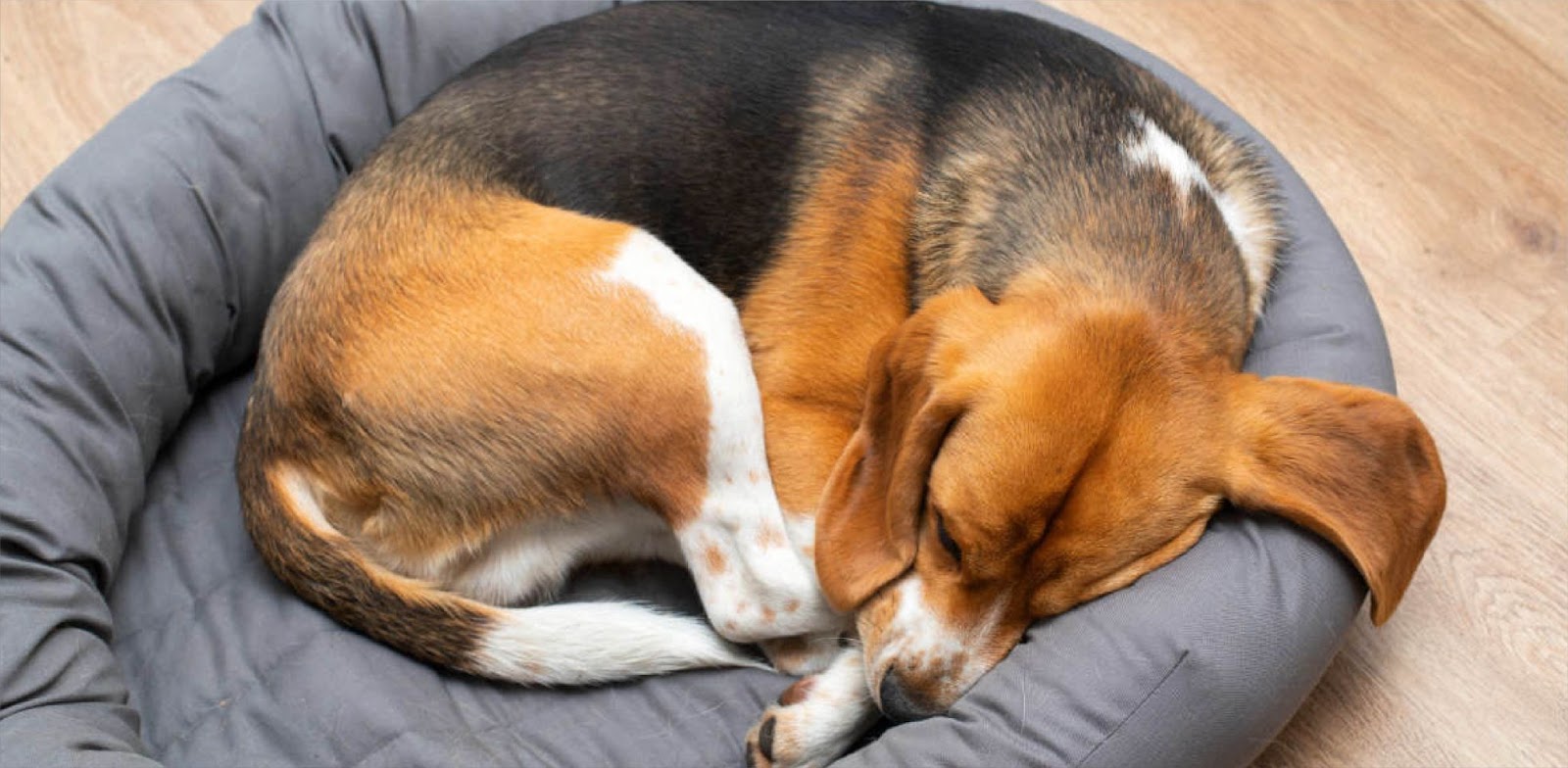
If you have a dog or have spent enough time around one, you’ll already know that they don’t sleep for longer stretches of time like humans. This is because dogs spend less time in REM sleep than humans. Their sleep cycles are much shorter and dogs are more sensitive to sounds and smells, so they are easily disturbed when sleeping. Because of this, a good portion of a dog’s day is spent sleeping. When they are awake, dogs are much more active than humans. It's common for dogs to sleep for more than 8 hours per day.
The reason why dogs sleep more than humans is based on their evolutionary traits. The modern dog evolved from wolves which have remained largely unchanged since their ancient carnivorous ancestors.
While the modern day dog is an omnivore, meaning they can eat both animal and plant foods, their sleep cycle is compatible with that of a carnivore. In the wild, carnivores tend to sleep more than herbivores, and this trait has stayed the same in dogs.
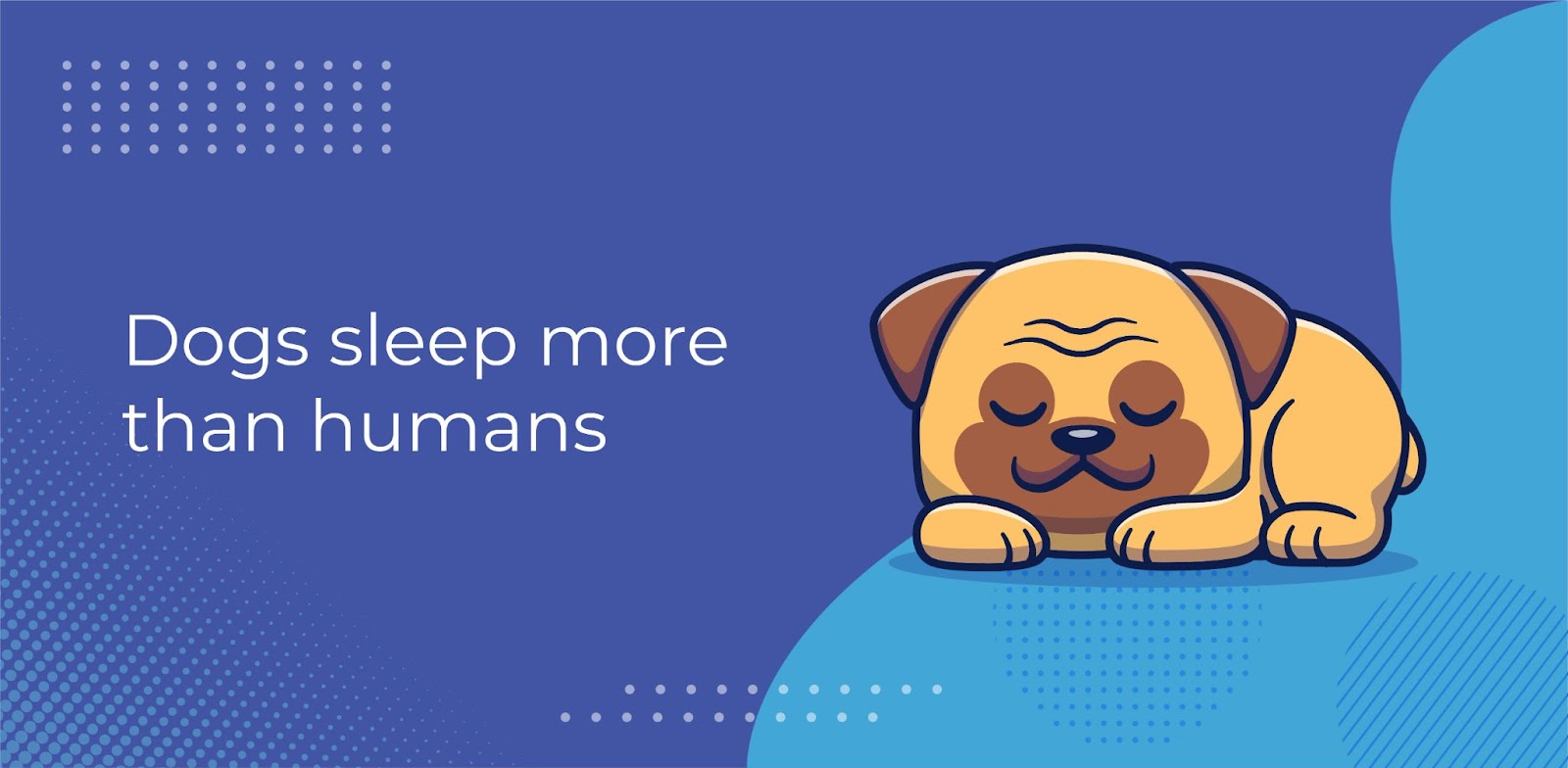
All dogs, regardless of age or breed, sleep more than humans. However, the amount of sleep varies depending on age and certain breeds.
Similar to infant humans, puppies need more sleep than older dogs. According to the American Kennel Club, puppies sleep 18 to 20 hours a day until they reach 16 weeks, where they average about 14 hours a day. Puppies tend to wake up at night like babies and need to be let out. Sleep training a puppy also coincides with potty training or crate training.
Adult dogs sleep anywhere from eight to 13 hours per night, with an average of 11 hours. Adult dogs, or dogs between the ages of one and two, tend to sleep more at night than puppies. A dog’s sleep schedule tends to match those of their owners—if you’re a night owl, your dog will probably be one, too. Adult dogs still take several daytime naps and tend to sleep up to 37% of the day.
Senior and middle aged dogs, or dogs between the ages of 7 to 11 depending on breed, tend to wake up less often during the night and sleep later into the day for about 16-18 hours per day.
Different dog breeds have different sleep habits and requirements. Some breeds, like Mastiffs, Basset Hounds, Bulldogs, Saint Bernard, and Chow Chows, sleep the most. More active breeds like Labradors, Airedale Terriers, and Border Collies sleep much less.

Like humans, health conditions, exercise, environment, age, and more can impact your dog’s sleep and health. Here’s what can impact your pooch’s sleep.
Age is one of the key factors in a dog’s sleeping requirements. Puppies and older dogs need the most sleep, with 18 to 20 hours daily, while adult dogs require eight to fourteen hours.
Giant breeds, like Great Danes and Mastiffs, tend to sleep more than smaller dogs and might sleep up to 18 hours per day. Medium size dogs, like Beagles and Corgis, sleep around 10 to 14 hours a day while tiny and smaller dogs sleep around 14 to 16 hours per day. Some breeds, like Huskies, German Shepherds, and Dobermans, which were bred for a task and as guard dogs, tend to sleep less.
The canine sleep cycle is designed for frequent, shorter naps during the day instead of one, consistent sleep at night. This slower sleep cycle means that dogs spend less time in REM sleep (Rapid Eye Movement) than humans and get less deep sleep. Since dogs sleep frequently, they can recover from the lack of time in deep sleep quickly.
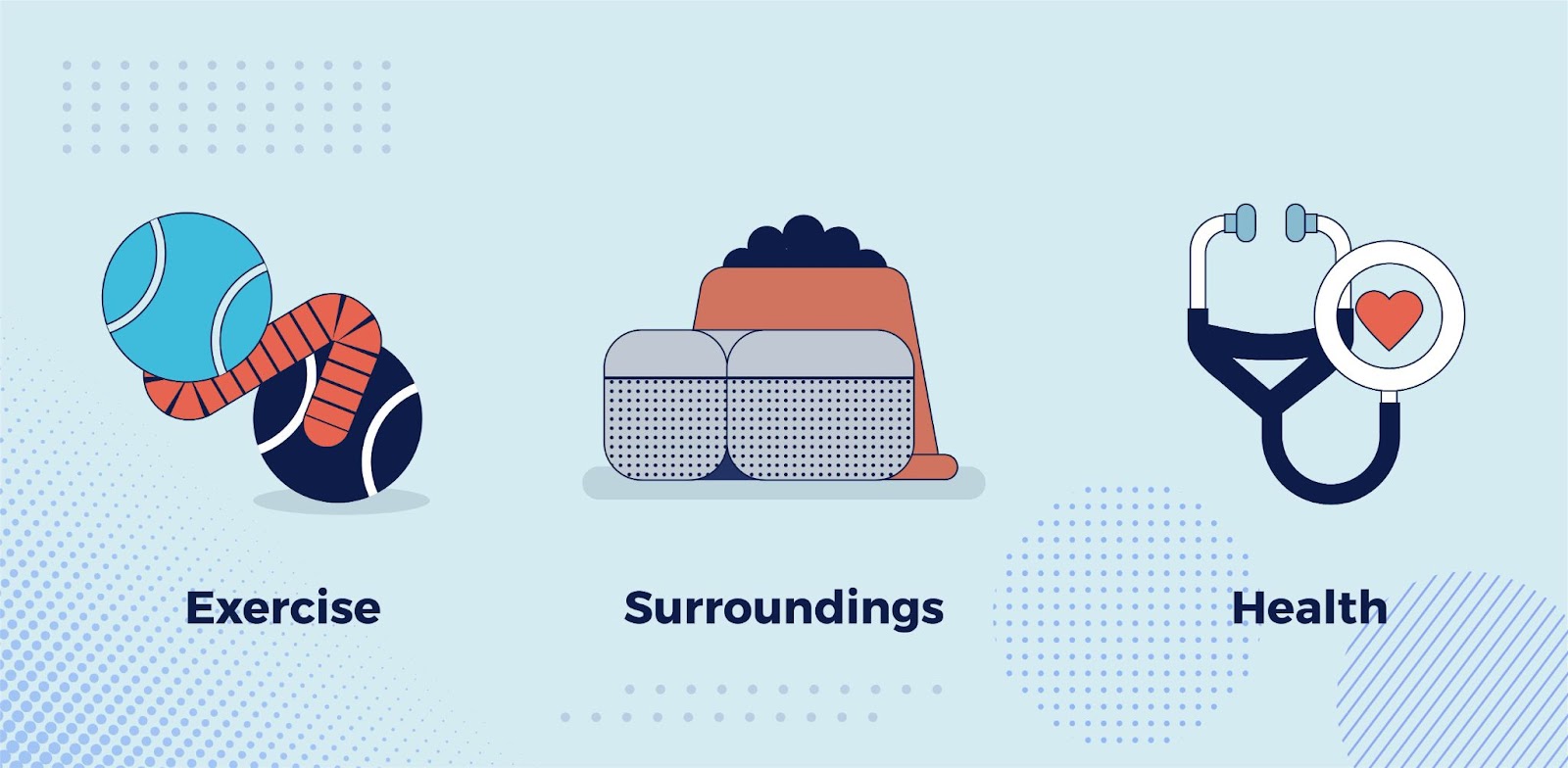
Each dog has a different activity level depending on their breed, lifestyle, and general energy level. Exercise, or lack of, can impact your dog’s sleep patterns.
If a dog doesn’t get enough activity during the day, they tend to have extra energy at bedtime, making it difficult to wind down and get to sleep. The most active and energetic dog breeds (Border Collies, Australian Shepherds, and Golden Retriever) are ready to go when awake, but when it’s bedtime, they love a good snooze.
Just like us, a change in surroundings can impact your dog’s sleep patterns and habits. Life events like moving or adding a baby to the family can disrupt their sleep.
Along with new surroundings, loud noises like fireworks and thunderstorms can scare dogs and disrupt their sleep. Luckily, you can get anti-anxiety medications and sedatives to help calm your dog down and help them sleep.
If your dog has health problems, their sleep can be negatively impacted. One of the most common health problems in dogs, especially older dogs, is urinary disease.
Symptoms like incontinence and frequent urination can make it difficult for dogs to sleep and cause frequent waking. Along with urinary issues, allergies, skin, or joint health problems cause itching, coughing, and pain that can disrupt sleep.
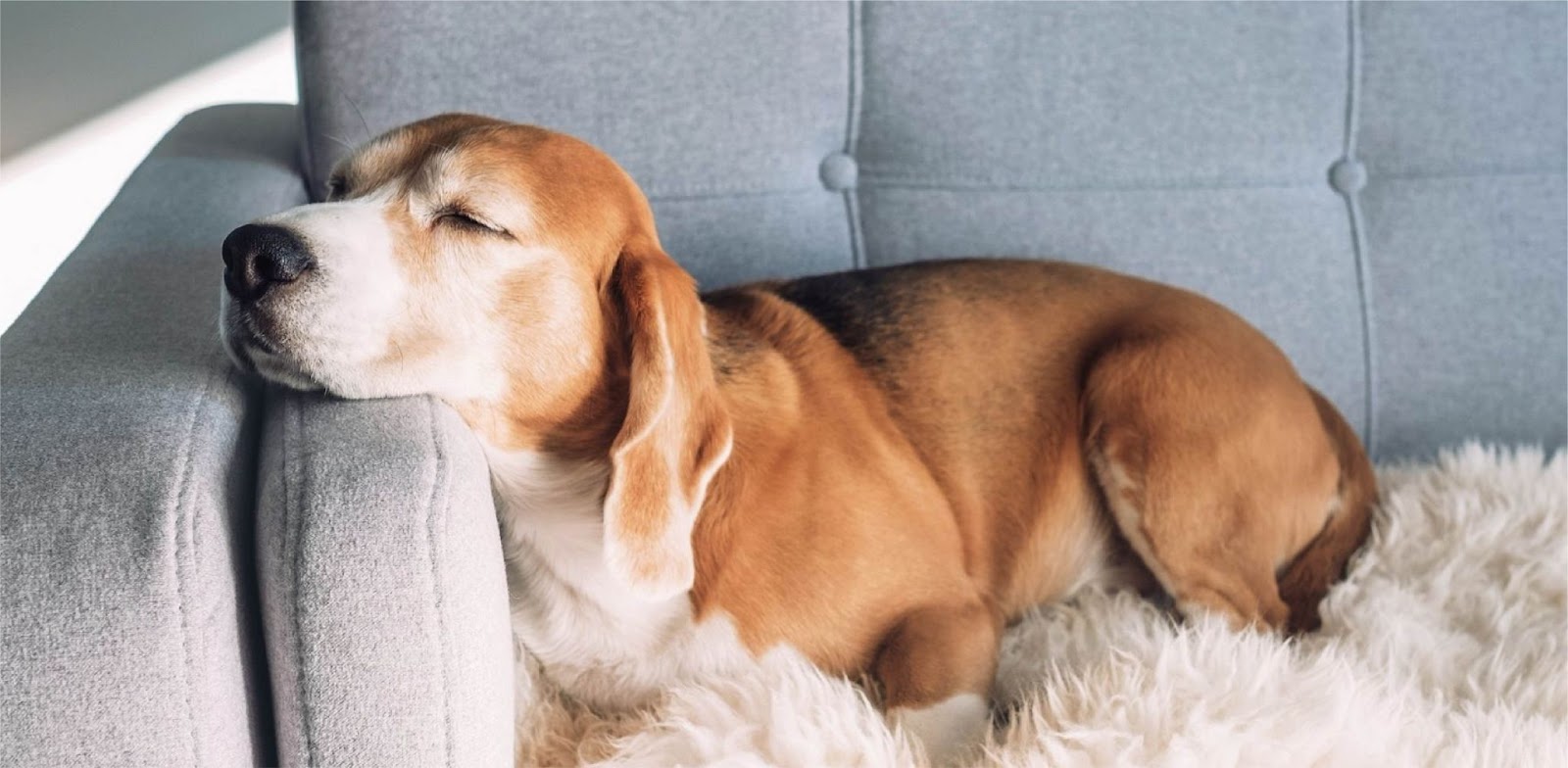
Dogs are highly adaptable animals thanks to their social nature and pack mentality. If your dog’s environment has suddenly or dramatically changed recently, they might be getting less sleep than usual.
Since dogs tend to sleep regularly, there haven’t been many studies concerning sleep deprivation in dogs. However, one study found dogs experience some of the same symptoms of sleep deprivation that humans do, such as:
Here are a few other signs your dog isn’t getting enough sleep:
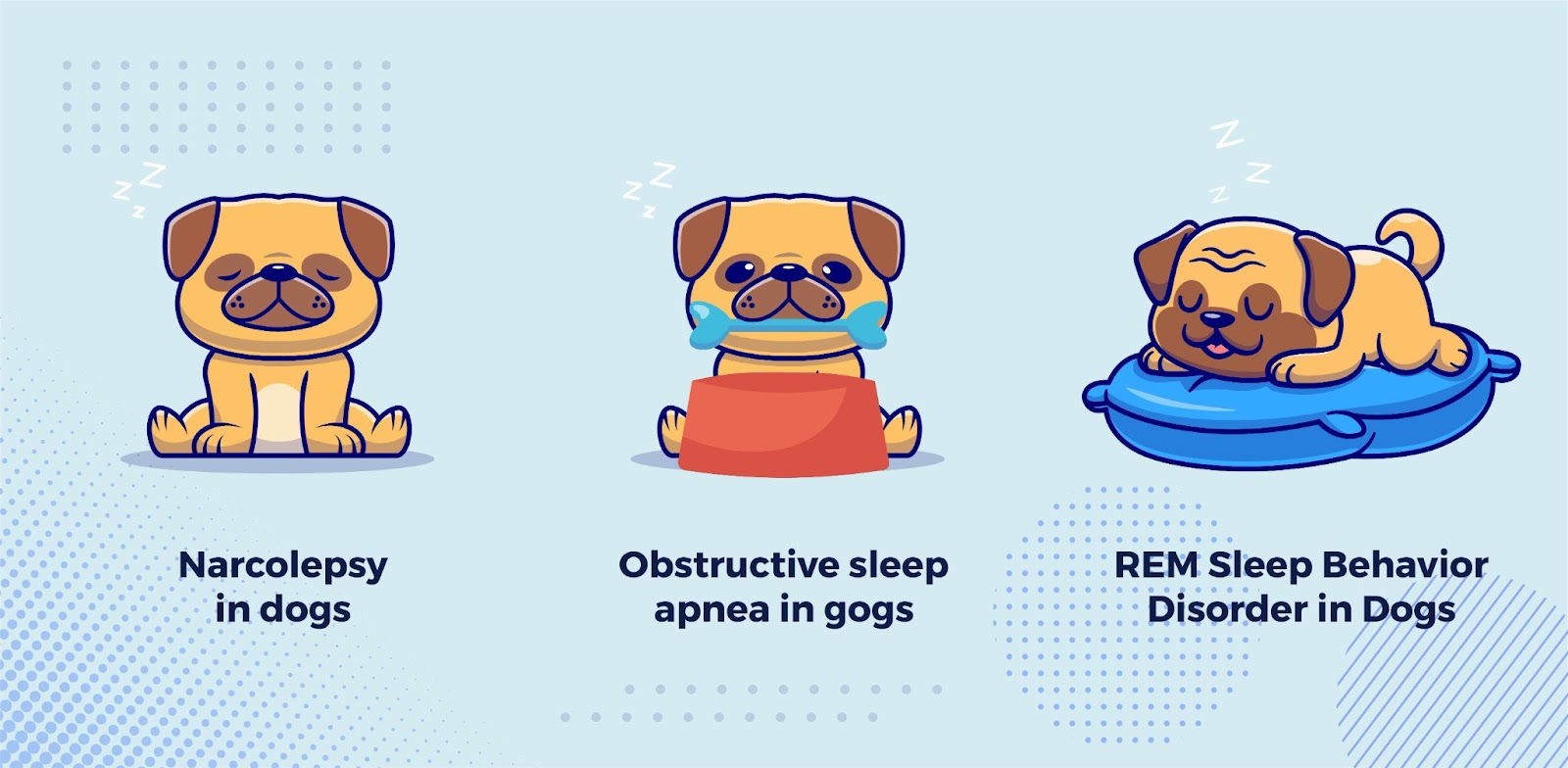
Just like us, your pup can also experience some common sleep problems found in humans. Sleep disorders in dogs are rare compared to humans. Here are a few to watch out for.
Symptoms of canine narcolepsy include excessive daytime drowsiness and cataplexy, or loss of muscle tone and control that can lead to fainting. Narcolepsy is the most common in Dobermans and Labrador due to genetics, but can present in dog breeds history of the condition. While there is no cure for narcolepsy in dogs, it can be managed with certain medications.
Canine sleep apnea most often affects brachycephalic breeds. Brachycephalic dogs have a shorter snout and nose, like Boston Terriers, French Bulldogs, Boxers, and English Bulldogs. Sleep apnea in dogs causes similar symptoms to humans with the condition, with the most common being loud, chronic snoring.
If you’ve ever seen a dog move their paws or legs when they are sleeping, they might have REM Behavior Disorder. Most often, your dog is probably dreaming about chasing that squirrel they saw in the yard, but if your dog is frequently moving in their sleep, it’s time to schedule a vet appointment.
REM Behavior Disorder causes movement during sleep and can sometimes escalate into aggressive behavior, attacking objects, or walking into walls when sleeping. Luckily, this condition can be treated with medications that reduce movement during sleep.

Often, a health issue is not the root of your dog’s sleep problems. It’s possible their routine has been disrupted or they want a more comfortable bed or sleep surface. Here are some tips to help improve your dog’s sleeping habits.
No one, dogs included, wants to sleep in an uncomfortable bed! If your dog sleeps on a dog bed, you might want to consider upgrading to a better option such as memory foam. If your dog sleeps with you, maybe they are hot, cold, or want a pillow or blanket. If you’ve gotten a poor night’s sleep, you’re more likely to experience a bad mood, and the same applies to your dog.
Dog owners know that dogs have their favorite “spots” in the house. From a chair, a sunny place by the window, or at the foot of your bed, dogs will sleep and lay down where they are the most comfortable. Let your dog decide where they want to sleep instead of making them stay in a certain location at night.
Keeping your dog on your schedule will ensure that they stick to sleeping and eating at a certain time. Dogs are adaptable and will adjust to your schedule quickly and get used to habits like when it’s time to eat, time for you to get home, etc.

All mammals have light-impacted circadian rhythms. Letting your dog sleep in a dark and quiet room will improve their sleep quality.
There are numerous studies and evidence that exercise improves sleep in humans, but there hasn’t been as much research into the connection between sleep and exercise in dogs.
However, there is some evidence that exercise can improve sleep quality in dogs, especially more active breeds. A 2020 study found that regular exercise decreased the risk of chronic illness in dogs.
While there are health and emotional benefits of sleeping with your dog, if you and your pooch are sharing a bed and find you’re both tossing and turning, it might be time to go your separate ways at night.
One study from 2020 found sharing a bed with your dog can disrupt both human and canine sleep patterns. The study found that these disruptions can happen even if you don’t realize it, resulting in poor sleep quality.
While dogs are usually good sleepers, if you’ve noticed your dog is sleeping less, more, or poorly, it’s best to consult your veterinarian. Sleep is vital to your dog’s overall health and being able to recognize signs of distress in your dog will make you a better pet owner and will help keep your dog’s health in check.


 Showrooms
Showrooms
About The Author
Dustin Morgan
Sleep Expert & Store Manager
Dustin Morgan is the Chief Mattress Analyst and Sleep Technology Expert at SleePare. He combines his computer science background with his passion for sleep innovation. With personal experience testing over 200 mattresses, Dustin offers unmatched insights into finding the perfect sleep solution for various needs. His work focuses on delivering honest and detailed comparisons and advice to help individuals achieve their best sleep. When he is not exploring the latest sleep technology, Dustin enjoys spending time in the great outdoors and gaming in his Virginia home.